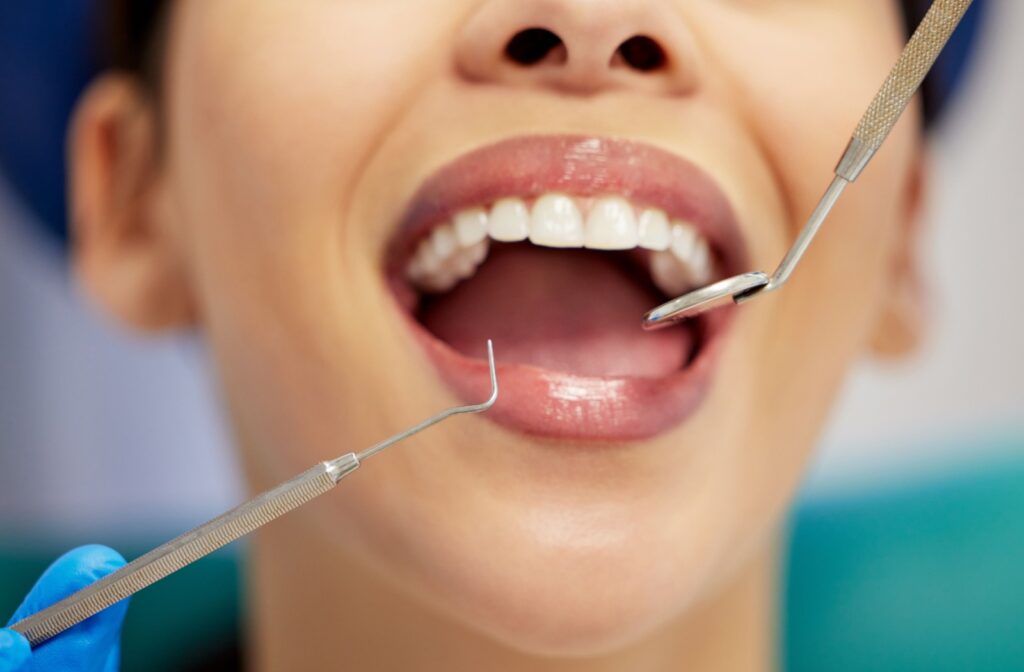
When you schedule a dental visit, it’s helpful to know what to expect and how much time to set aside. A common question we hear is about the length of a professional dental cleaning. Understanding the process can help you feel more prepared and comfortable for your appointment.
A routine dental cleaning appointment typically lasts between 30 and 60 minutes. This timeframe allows your dental hygienist to be thorough and gentle, giving your teeth the attention they need.
What to Expect During a Professional Dental Cleaning
Your dental cleaning is a straightforward process focused on removing plaque and tartar to help prevent cavities and gum disease. Each step plays a role in keeping your smile healthy.
The Initial Examination
Your visit starts with a comprehensive look at your teeth and gums. The hygienist carefully checks for any signs of inflammation or other potential concerns. This initial review helps us customize the cleaning to your specific needs.
Plaque & Tartar Removal
Next, your hygienist carefully removes plaque and hardened tartar. This process, called scaling, focuses on the surface of your teeth and the area around your gum line. It’s an important step for your long-term oral health.
Professional Polish & Floss
After the tartar is removed, your teeth are polished with a gritty paste that helps remove surface stains. This leaves your teeth feeling smooth and clean. The appointment finishes with a professional flossing to clean between your teeth and reach any remaining plaque.
Factors That Affect Your Cleaning Time
While most cleanings last less than an hour, some appointments may take a bit longer. There are several factors that can influence the duration of your visit.
The Time Since Your Last Visit
If it has been more than a year since your last cleaning, you might have more plaque and tartar buildup. Removing this extra buildup often requires more time. Regular visits can help make your cleanings quicker and more efficient.
Your Oral Health Needs
The condition of your teeth and gums plays a big role in how long your appointment lasts. For example, a deep cleaning—also called a scaling and root planing—is a more involved procedure for gum disease. This will naturally take longer than a standard cleaning.
Special Considerations for Dentures & Restorations
If you have dentures, bridges, or crowns, your hygienist will take extra care to clean around them. This detailed work is necessary to maintain the health of your supporting teeth and gums.
Does Your Dentist Numb You for a Teeth Cleaning?
The question of discomfort is a common one, especially if you have sensitive teeth or gums. We understand how uneasy some people may feel about their dental visits, and your comfort is always a priority for our team.
Is a Dental Cleaning Painful?
For most people, a routine dental cleaning causes little to no discomfort. You might feel some light pressure or scraping sensations, but it’s not typically a painful experience. If you have sensitive areas, please let your hygienist know, so they can adjust their technique.
When Numbing Might Be Used
Numbing is not standard for a routine cleaning. However, for a deep cleaning where the hygienist works below the gum line, a local anesthetic may be used. This helps keep you comfortable throughout this more intensive procedure.

What to Do After Your Dental Cleaning
Your mouth should feel fresh and clean after your appointment. However, there are a few things to keep in mind to get the most from your professional cleaning. These small steps can help you maintain that just-cleaned feeling.
Can I Eat After a Dental Cleaning?
You can usually eat right away. However, if you received a fluoride treatment, it’s a good idea to wait at least 30 minutes before you eat or drink. This delay allows the fluoride to fully absorb into and strengthen your teeth.
How to Manage Tooth Sensitivity
Some people experience temporary tooth sensitivity after a cleaning. This is normal. This sensation should fade within a day or two. Using a toothpaste designed for sensitive teeth can help you manage any discomfort.
The “2-2-2” Rule for Home Care
To maintain your oral health between visits, you can try to follow this simple rule for brushing. Brush for 2 minutes, 2 times a day. It’s a good idea to see your dentist at least 2 times a year for a check-up and cleaning.
Your Regular Dental Visit in SE Calgary
Consistent dental cleanings are a foundation of good oral health, especially as you get older. Taking a proactive approach to your dental care helps address small issues before they become larger problems. Regular visits support your overall well-being.
How Often to Schedule a Cleaning
Most people benefit from a professional dental cleaning every six months. Based on your age and individual health needs, your dentist may recommend a different schedule.
The Importance of Consistent Check-ups
Regular appointments with your dentist in SE Calgary do more than just clean your teeth. They’re also an opportunity to check on your overall oral health, including your gums, tongue, and any dental work you have.
At Embrace Dental Care, our team is dedicated to providing you with personalized care in a comfortable setting. If you have questions about your oral health or are ready to book an appointment, please contact us today.




